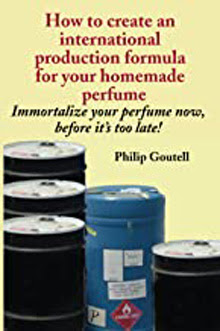At lest once every 2 weeks I receive an email with the message, “I have an idea for a perfume.” Usually the message concludes with a phone number and the words, “call me.”
Perfume is a funny art form. If somebody said to you, “I have an idea for a painting” you might respond, “So what? Why talk about an idea for a painting? Just go out and paint it!” Likewise, in songwriting, music composing, and writing poetry or books. You don't talk about your “idea for...” You go out and do it.
But I fear that when someone approaches me saying “I have an idea for a perfume,” they are thinking like the person who has an idea for (1) a new Hollywood blockbuster, (2) a new hit game show, (3) a brilliant new product everyone will buy, ... etc. Their vision is on a pot of gold, not a bottle of perfume. They are looking for 90 percent of the profits on a project where 100 percent of the capital, research & development and marketing will be provided by somebody else. And to think that Coco Chanel only got 10% of the profits on her “No.5” perfume! Going through the process of making “their” perfume is not to their taste at all!
Now if someone comes to me and says, “I have an idea for marketing a perfume, where can I get my own perfume without spending a fortune?” I have an answer. I simply tell them to buy a copy of my book, "Creating Your Own Perfume With A 1700 Percent Markup" and read it. It gives the would be perfume marketer a detailed description of how you can get your “juice” (perfume compound) without spending a fortune and the steps you'll have to go through to bottle it and get it ready to sell. And the less you are hung up on exactly what your perfume must smell like, the simpler the “get it to market” process becomes.
But what about the rare case of the person whose idea for a perfume actually involves wanting to achieve a specific fragrance?
Among those whose serious interest is the fragrance itself, I've seen (and heard about) some pretty far out ideas (which I'll not detail in the interest of potential client confidentiality!) The more far out of these ideas would give a chemist headaches in trying to sort out what combination of molecules just might take the perfumer in the right direction – without burning the skin off the consumer, causing an explosion, or producing such a toxic mess that it could only be transported by a hazmat team.
But suppose YOU have “an idea for a perfume” and you're serious about it, so serious that you are willing to learn a bit about perfume creation, even if you suspect that you may not, on your own, come up with a perfect recreation of the perfume of your mental vision? If you fall into this elite group of artistic but practical people, I have an artistic – and practical - suggestion for you. It's called the PerfumersWorld Foundation Course.
Last spring I had the opportunity to spend a few days with Steve Dowthwaite, founder of PerfumersWorld and creator of the Foundation Course. Steve was conducting a 5-day workshop in New York City and one of the practical exercises involved having students “match” a classic fragrance using just 25 aroma bases (all of these are provided in the Foundation Course kit.)
For one very classic fragrance, some good matches were created. For a second fragrance, no good matches were produced but there was a good deal of discussion – and some suggestions by several chemists – why a credible match for this fragrance could not be produced from our 25 aroma bases. (Later I was told that a number of top perfumers had failed at this same challenge, only they had been using far more than 25 aroma materials!)
The fact is that perfumery today makes use of some very state-of-the-art aroma materials, some of which are held very closely by the companies that created them and are NOT available to just anyone who might want them.
So if you have an idea for a perfume – a vivid mental picture of a fragrance you would like to create – or see created, the Foundation Course might NOT be the answer for you ... unless --
Unless you really have a long-range interest in perfume, an interest that is so strong that you are willing to accept the reality that, at the beginning of your work in perfumery, you will not be able to produce fragrances of the quality you will be able to produce as your work progresses. For example, you can't expect to pick up a guitar for the first time and give a sellout concert. You have a learn a few cords first.
If your interest in perfumery is limited to realizing this one particular perfume that is stuck in your imagination, and if this one perfume idea of yours just happens to be a “difficult” fragrance to match, your best hope is to recruit a perfumer who will work with you although this could be expensive.
So it's all a matter of motivation. Do you want to create just a single perfume ... or do you want to become a perfumer?
Thursday, December 18, 2008
Subscribe to:
Post Comments (Atom)


No comments:
Post a Comment